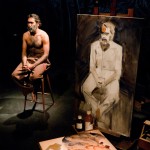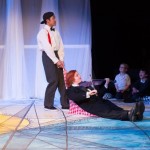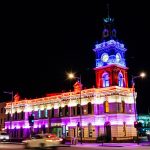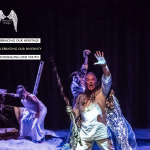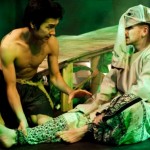Freedom
Genre: Drama
Venue: Arcola Theatre 24 Ashwin Street, Dalston, London E8 3DL
Low Down
When I walked into the Arcola Theatre’s studio space to view Freedom, the stage seemed unusually disjointed from the hemisphere-shaped auditorium seating arrangement. The back wall of the set seemed very detailed yet at least half the seats faced a side-on view. As I wasn’t quick enough to get a seat facing the stage front-on, I missed eighty per cent of the action: for instance, Indranyl Singharay’s portrayal of Fariad, the son, in the first fifteen to twenty minutes of dialogue with Rian Perle (playing his father Benham) was totally lost to me as Fariad was totally masked from view. Consequently, I could not appreciate one expression or gesture, which accompanied the strong clear voice with whom I was desperately attempting to engage. Every element of the production’s design worked to prevent my clear view of Fariad: specifically, the fact that Benham sat or stood on a raised platform in traditional flowing robes of a Tajikistan man while Fariad mostly crouched at floor level.
Review
For a fleet moment at the very beginning of the play, the drama gripped me with its image of Fariad, looking every bit like a fighting guerrilla soldier encountering his father’s comment that he could stop playing the part as ‘the danger’ was over. While at this point, the audience does not know the nature of the threat, the overt links to ‘Middle East Terrorists’ is plain to see. This fleeting promise, however, is followed by twenty minutes of frustration.
The frustrations sums up the production for me: even while I came to value Rick Limentini writing and direction and Rebeca Cobos’, Indranyl Singharay’s and Rian Perle’s acting. I also came to appreciate Rebeca Cobos’ courage as a producer prepared to stage such a difficult and testing story.
Nonetheless, I believe that the company did not pay sufficient enough attention to how the audience might be expected to view their important story. My side-on seat view of the stage, for instance, provoked me desperately enough to wonder if anyone in the production crew had checked out for ‘blind spots’ around the house. Had anyone looked at how Jennifer’s imprisonment in the barn might be literally viewed from where I sat?
So absolute was the masking of stage action for me that at one stage I began to entertain the view that perhaps the creative team had deliberately set up such sight lines. However, there were too many other indicators that ‘did not add’ up dramaturgically. Primarily, how the play seemed to ambitiously characterise Fariad as a young man straight off a farm in Tajikistan who, in extraordinary leaps of fortune and coincidence, ends up composing ballads for a London-based rock band. Here I claim some personal knowledge as I know was it takes for migrant ‘kids’ like me who are the first of their generation to go to university and straddle the vast divide between their family’s cultural beliefs and those in their academic and working lives.
As it is an enormous distance to cover, I wondered if a ‘less is more’ approach might not serve the narrative better: that is, that the drama should go into moredepth in dealing with the father and son’s relationship and Fariad and Jennifer’s cultural dilemmas. In this way, the tensions which living between Tajikistan and London brings for Fariad and his opium-growing family should be considered in considerable more detail. Arthur Miller reminded readers in an interview for The Independent in 1995 that his rule in playwrighting was the principle that
“Generalisation is the death of art. It’s in the details where God resides. If I could pray for anything, it would be to get more details.”
The story framed in Freedom is sufficiently interesting and original to engage a contemporary audience. In particular, it is the story of the persistent dilemma faced by many, many first and second-generation ‘kids’ who know only too well how their family histories are full of compromised ethical questions due to desperate economic circumstances and war. But children remain truly helpless in the face of their parents’ and family’s legacy: what previous generations have done ‘for a living’ can set, as it did for Fariad, the course for the quality of their lives through no fault of their own. In contemporary terms, as education and technology allow us to grow more aware of how cross-cultural and gender issues impact on the day-to-day happenings of our everyday lives, the present generation rightly questions how it might have family relationships free from the destructive histories of past and be free to find their own place in the world.
I fully applaud the staging of Freedom and I hope that its producer and artists receive the support from audiences that that reflects their interesting dramatic narrative.
Reviewed by Josey De Rossi 30 January 2012
Website :
